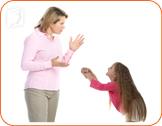
After the age of 40, many women suffer from symptoms of menopause. From night sweats and fatigue to irritability and mood swings, menopause can be a precarious time in any woman's life. Sometimes, the slightest thing can set you into a fit of rage, so dealing with children on top of menopausal mood swings can be trying. Read on to learn about a few tips to handle children while dealing with your emotions during menopause.
Can I Control My Mood Swings?
Evidence suggests that fluctuating hormone levels are largely responsible for these emotional whirlwinds during menopause. This is because estrogen plays a role in regulating serotonin levels. Serotonin, the "feel good" neurotransmitter, helps to elevate mood, and if this compound declines, your mood is certain to follow.

Mood swings can be reduced by incorporating a few simple lifestyle changes, such as following a healthy diet and exercise regimen. To minimize the effects of mood swings, exercise for at least 30 minutes five days a week and eat foods rich in protein, complex carbohydrates, dairy, fresh vegetables, and fruit. Deep breathing techniques and listening to light music can help dispel a mood swing in the heat of the moment.
Handling Children and Mood Swings
Dealing with mood swings during menopause can be very difficult on its own, and having to put up with your children's tantrums and rage can be even harder, especially since children do not understand menopause and what it entails. Learn to cope with irritability by following these tips:

Think positively. Using encouraging or supportive words, not idle threats, will help you and your kids calm down. Find the middle ground and instead of nagging or yelling.
Establish a connection. Take a few minutes to talk to your children and show interest in their activities such as a game or television program. Showing support allows kids to establish a connection and they're more likely to listen to you the next time you experience a mood swing and need to calm your nerves.
Take a break. Set aside an hour each day for you to rest. Occupy the kids with activities while you take time to nap, read a book, or listen to music. You both will appreciate the break!
Children can be a handful at times, but learning to cope with your mood swings and not taking your frustrations out on them will strengthen your relationship with your children. Click on the following link to learn about risk factors for mood swings.
Sources
- Amin, Zenab, Turhan Canli, and C. Neill Epperson. "Effects of Estrogen-Serotonin Interactions on Mood and Cognition". Behav Cogn Neurosci Rev 2005; 4; 43.
- Dr. Love, Susan, and Karen Lindsey. Dr. Susan Love's Menopause and Hormone Book. New York: Three Rivers Press, 2003.
- Molecular Psychiatry. (n.d)."Estrogen Promotes Gender Difference in Brain's Response to Stress". Retrieved from www.psycheducation.org.
- The Health Center.(n.d)."Adult Mood Swings". Retrieved from www.thehealthcenter.info.



